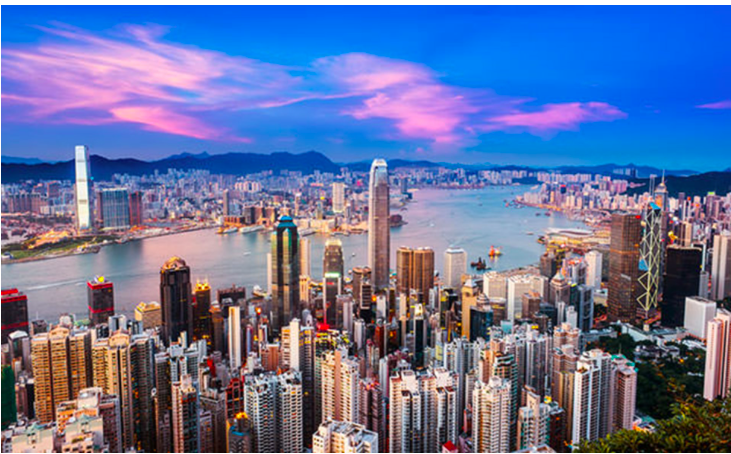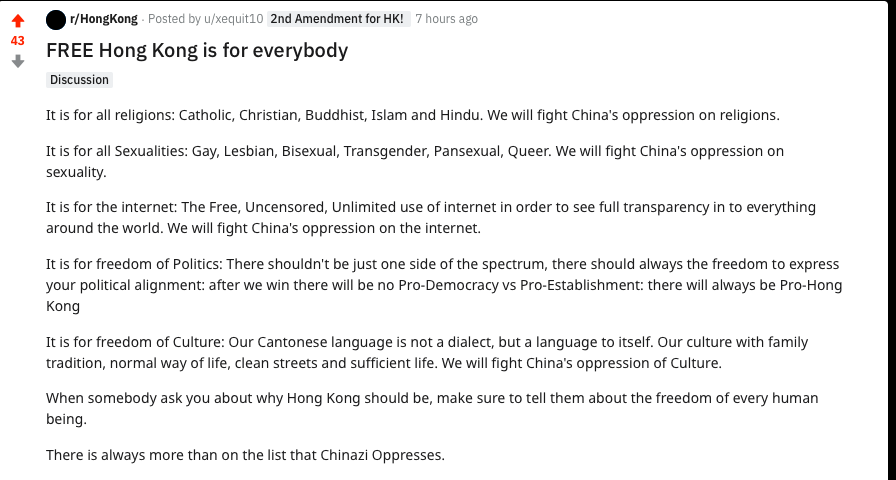
On the eve of Thanksgiving in America, it is, I think, most appropriate to write about Hong Kong, and here is why I say so: How Laissez-Faire and Private Property Saved The Pilgrims
Recently, when Houston Rockets General Manager Daryl Morey voiced his excellent support of Hong Kong’s freedom demonstrations — “Fight for freedom,” he wrote, “stand with Hong Kong!” — in direct opposition to Communist China’s authoritarian regime, many of our garden-variety liberals who have been spoiled rotten by America (and for this reason take her entirely for granted) came out swinging at Daryl Morey, who was totally in the right.
Among the most prominent of those garden-variety progressives was none other than LeBron James, one of the many thousands of professional athletes whom the (relative) free-market of America has made into a phenomenally wealthy human. Or perhaps I should say: “African-American male, he/him.”
Please note that in China, LeBron James would not have the legal sanction to his wealth — the product of his labor and talent — nor to the freedom of expression he enjoys here.
Note also what he actually said:
“[Daryl Morey] was misinformed [and] wasn’t educated on the situation at hand.”
Unquote.
In fact, it’s the other way around. Daryl Morey was incontrovertibly educated on the situation at hand.
Hong Kong, as I’ve written about before, is unique among all cities and civilizations in the entirety of human history. The only other place that compares — and it compares for the same reason — is New York City.
The reason that Hong Kong — a small barren, resource-poor rock in the middle of the South China Sea — grew into one of the wealthiest, most civilized and sophisticated places on planet earth, in an incredibly short amount of time, may be summed up in a short phrase:
Hong Kong is an absolutely irrefutable testament to the elegant order of laissez faire — true laissez-faire. Which is not a mixed economy, nor a crony capitalist economy, both of which things, incidentally, in one way or another, no matter the continent or country, virtually all people today are calling for more of.
The person most responsible for Hong Kong’s meteoric rise to the greatness of an unmatched civilization (because of its explicit implementation of laissez-faire) is a person you’ve perhaps never heard of: Sir John James Cowperthwaite (1915–2006).
As Lawrence W. Reed — not the same Mr. Reed who wrote the timeless essay titled I, Pencil which, in many ways, is the only thing you’ll ever need to know — put it:
“Some of us just write about pro-freedom ideas. This guy actually made them public policy for millions.”
Quoting from:
The Man Behind the Hong Kong Miracle
If we are to believe the critics [of laissez-faire], Hong Kong must be a veritable Hell’s Kitchen of greed, poverty, exploitation and despair.
Not so. Not even close.
Maybe this is why socialists don’t like to talk about Hong Kong: It’s not only the freest economy, it’s also one of the richest. Its per capita income, at 264 percent of the world’s average, has more than doubled in the past 15 years. People don’t flee from Hong Kong. They flock to it. [Sounds a little like racist, fascist America.] At the close of World War II, the population numbered 750,000. Today it’s nearly ten times that, at 7.1 million.
Positive Non-Interventionism
The one man most responsible for [Hong Kong’s] perennial achievement: Sir John James Cowperthwaite should forever occupy top shelf in the pantheon of great free-thinkers….
Compare Britain—the birthplace of the Industrial Revolution, the nineteenth-century economic superpower on whose empire the sun never set—with Hong Kong, a spit of land, overcrowded, with no resources except for a great harbor. Yet within four decades the residents of this spit of overcrowded land had achieved a level of income one-third higher than that enjoyed by the residents of its former mother country.
A Scot by birth, Cowperthwaite attended Merchiston Castle School in Edinburgh and then studied classics at St Andrews University and at Christ’s College at Cambridge. He served in the British Colonial Administrative Service in Hong Kong during the early 1940s. After the war he was asked to come up with plans for the government to boost economic growth. To his credit, he had his eyes open and noticed that the economy was already recovering quite nicely without government direction. So while the mother country lurched in a socialist direction at home under Clement Attlee, Cowperthwaite became an advocate of what he called “positive non-interventionism” in Hong Kong. Later as the colony’s Financial Secretary from 1961 to 1971, he personally administered it.
“Over a wide field of our economy it is still the better course to rely on the nineteenth century’s ‘hidden hand’ than to thrust clumsy bureaucratic fingers into its sensitive mechanism,” Cowperthwaite declared in 1962. “In particular, we cannot afford to damage its mainspring, freedom of competitive enterprise.”
He didn’t like protectionism or subsidies even for new, so-called “infant” industries:
“An infant industry, if coddled, tends to remain an infant industry and never grows up or expands.” He believed firmly that “in the long run, the aggregate of the decisions of individual businessmen, exercising individual judgment in a free economy, even if often mistaken, is likely to do less harm than the centralized decisions of a Government; and certainly the harm is likely to be counteracted faster.”
Ever since the days of John Maynard Keynes, economics has been cursed by the notion that human action should be distilled into numbers, which then become a “pretense to knowledge” for central planner types. In many collegiate economics courses, it’s hard to tell where the math leaves off and the actual economics begins. To Cowperthwaite, the planner’s quest for statistics was anathema. So he refused to compile them. When the economist Milton Friedman asked him in 1963 about the “paucity of statistics,” Cowperthwaite answered:
“If I let them compute those statistics, they’ll want to use them for planning.”
If that sounds quaintly backward or archaic, let me remind you that the biggest economic flops of the past century were both centrally planned and infatuated with numbers. Whole ministries were devoted to their compilation because even lousy numbers gave the planners the illusion of control. But not in Hong Kong!
Statistics, no matter how accurate or voluminous, are no substitute for sound principles. Powered by an abundance of the latter under Cowperthwaite, the Hong Kong economy soared during his tenure. Writing in the November 2008 issue of The Freeman, Andrew P. Morriss noted that in his decade as financial secretary, “real wages rose by 50 percent and the portion of the population in acute poverty fell from 50 to 15 percent.” It’s hard to argue with success. After Cowperthwaite’s retirement in 1971, less principled successors dabbled in social welfare spending but they financed it through land sales, not increased taxation. Tax rates to this day are right where the old man left them.
Lebron James last year came out in support of former quarterback Colin Kaepernick, saying: “I stand with anyone who believes in change.”
“Anyone?,” David Harsanyi recently wrote in direct response to this robotic platitude, and continued: “Of course, LeBron’s stand, as with most acts of pretend celebrity bravery, resulted in hosannas being thrown at him by the press, and, more importantly, never costing him a penny. [Spoiled] Americans [who are so spoiled that they don’t know how good they’ve got it] tend to use word like ‘stand’ and ‘fight’ in their political disagreements, although they never really have to stand and fight for anything. Tank Man stood and fought. The Hong Kong protesters stand and fight. We take to social media and argue. Posting a Nike-approved picture on your Instagram account of Kaepernick—adorned with the $40-million market-test slogan, ‘Believe in something, Even if it means sacrificing everything’—is not an act of bravery, LeBron.”
I don’t know that truer words have ever been spoken.
Finally, there’s an even deeper benefit to laissez-faire — true laissez-faire — one that is an elaboration upon the elegance of laissez-faire’s economic order: that benefit is the genuine harmony and goodwill, the unity and non-factionalizing among people, which a policy of live-and-let live brings with it.
That is why Hong Kong’s current generation is fighting so furiously and uncompromisingly: because they knew freedom. They had it. They lived it. They saw its goodness firsthand, its rightness, its inherent, inalienable justice. And many of them know also that the moment those freedoms are stripped by an authoritarian regime and its immense propaganda machine takes hold, entrenchment will set in, and those beautiful civilizing freedoms will be gone forever.
They fight with so much passion and beauty because they know that to lose it will be to lose it irrevocably. They know they must win. And they must. It is do or die, and they sense this, and my admiration for them knows no bounds, because they are up against a leviathan-sized Borg, utterly mindless, the “coldest of all cold monsters,” as Nietzsche well said, “who bites with stolen teeth” — the state.
I’ve been watching Hong Kong every single day, sometimes minute-by-minute, and this recent thread, written by a native Hong-Kongian, captures precisely what I mean about the natural harmony that exists among humans when humans are left alone:

Compare these passionate, brave, freedom-loving people with the spoiled-rotten ANTIFA and Occupy illiterates — whom the police they hate are in this country protecting their right to free speech which ANTIFA would abolish, and who would have us emulate something much closer to China’s authoritarian government — and it will either enrage you, or bring you to your knees:
Happy Thanksgiving.
